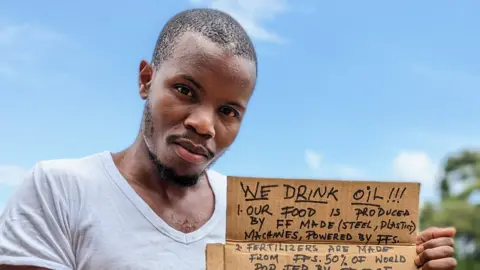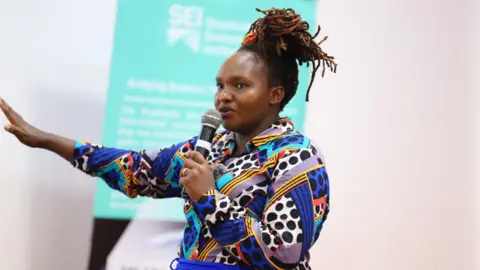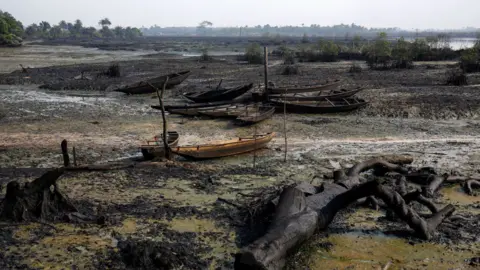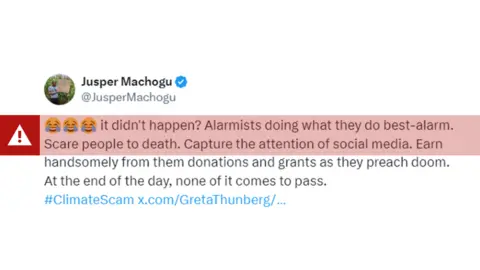 X/JusperMachogu
X/JusperMachoguClimate change deniers have found a new champion in Kenyan farmer Jusper Machogu. On social media, he has become known as a champion of fossil fuels in Africa, but there is more to his campaign than meets the eye.
On the face of it, 29-year-old Machogu is just a young farmer with a knack for social media.
On X, formerly Twitter, he regularly posts videos of himself clearing his land, planting garlic or picking avocados — offering viewers a window into life in rural Kisii, southwestern Kenya.
While agricultural content may get him clicks, likes and retweets, it is Mr Machogu’s denial of man-made climate change that has helped raise his online profile.
Since he began posting debunked theories about climate change, he has received thousands of dollars in donations — some of which came from individuals in Western countries linked to fossil fuel interests.
Mr Machogu insists this has not affected his views, saying they are genuinely held.
Scientists have proven that the Earth is warming due to greenhouse gases emitted into the atmosphere when we burn fossil fuels – such as oil, gas or coal.
But Mr. Machogu disagrees.
“Climate change is mostly natural. A warmer climate is good for life,” Mr. Machogu falsely claimed in a tweet posted in February, along with the hashtag #ClimateScam (which he has used hundreds of times).
The Intergovernmental Panel on Climate Change (IPCC) says Africa is “one of the lowest contributors to greenhouse gas emissions that cause climate change”.
However, it is also “one of the most vulnerable continentsto climate change and its effects – including more intense and frequent heat waves, prolonged droughts and devastating floods.
Despite all this, Mr. Machogu continues to insist that “there is no climate crisis”.
On social media, he has repeatedly posted baseless claims that man-made climate change is not only a “hoax” or “hoax”, but also a ploy by Western countries to “keep Africa poor”.
“[His views] are definitely coming from a place of lack of understanding,” says Joyce Kimutai, a Kenyan climate scientist who has contributed to IPCC reports.
 Dr Joyce Kimutai
Dr Joyce Kimutai“This is not religion, it is not just faith. It’s about analyzing data and seeing changes in data.
“Saying that the climate [change] it is a hoax it is not really true,” Dr Kimutai added.
Machogu began posting false and misleading claims about climate change in late 2021 after conducting his “research” on the subject.
Since then, he has launched his campaign – which he called “Fossil Fuels for Africa” - arguing that the continent should exploit its vast reserves of oil, gas and coal.
“We need fossil fuels to develop our Africa,” Machogu tweeted last year.
This view appears to be shared by some African governments, which have given their approval to new oil and gas projects despite having committed to “transition away“from fossil fuels.
Leaders such as Ugandan President Yoweri Museveni have argued this it is hypocritical for Western countries to impose restrictions on African states, when they have become rich from fossil fuels.
But climate activists like 24-year-old Nicholas Omonuk, from Uganda, point out that fossil fuel exploration has not always been synonymous with growth and development in Africa.
“In [Nigeria’s] The Niger Delta, there has been oil extraction since the 1900s, but the people there are still poor and still suffer from health hazards and pollution,” he said.
 Getty Images
Getty ImagesAnd yet Mr Machogu believes he has found a ready audience for his message – he has more than 25,000 followers on X.
“I think Africans are really embracing the fact that I’m saying, ‘Fossil fuels for Africa,'” he told the BBC.
But by tracking conversations involving Mr Machogu’s X handle, BBC Verify found that the majority of users engaging with his account are actually based in the US, UK and Canada.
Many of these users also promote conspiracy theories online – not only about climate change, but also about vaccines, Covid-19 or the war in Ukraine.
However peculiar his views may be, this online community has supported Mr. Machogu and helped him fund his campaign.
“Having said whatever I say, I’ve seen my follower count grow and I’ve had people contacting me saying, ‘How can we help you?'” he said.

BBC Verify looked at fundraising pages set up by Mr Machogu and found that, in the past two years, he has raised more than $9,000 (£7,000) in donations.
Mr. Machogu has posted online about using some of these funds to furnish his new home.
But he also claims to have used donations to help dozens of local families by building a water well, distributing gas bottles for cooking or connecting their homes to the electricity grid.
Among his donors were individuals with ties to the fossil fuel industry and groups known to promote climate change denial.
But Mr Machogu disputes suggestions that those donations have had any influence on his views on climate change.
“No one has told me to change my views,” insists Mr. Machogu.
“I don’t mind making money saying what I believe I need to say or doing what’s good for my community.”
By sharing his views online, he has undoubtedly caught the eye of many in the West who share his stance on fossil fuel exploration and climate change.
Canadian author Jordan Peterson retweeted one of his posts about fossil fuels, describing him as a “real African,” in contrast to what Peterson called a “poor, oppressed, useless African.” that is supposed to be imagined by “globalist utopians”.
An American fossil fuel lawyer paid for Machogu to travel to South Africa for a conference promoting African oil and gas late last year.
And, just a few months ago, a film crew from the UK traveled to Kisii to interview him for a new documentary depicting climate change as an “eccentric environmental scare”.
To some, Mr. Machogu’s newfound popularity has not come as a surprise.
“There’s been a real explosion in fossil fuel development projects in Africa,” says Amy Westervelt, an investigative US climate reporter who covers efforts to thwart climate policy.
“And because many countries are adopting policies that limit fossil fuels, Africa is also seen as a big market.
“So it’s very helpful for people in Africa to say, ‘We want these projects.’
This is definitely a point that Mr. Macho has done it – again and again – on social media.
But Dr Kimutai says his promotion of fossil fuels, coupled with his denial of human-caused climate change, could have consequences.
“Because we still have low levels of climate literacy in Africa and in Kenya, and if this conspiracy theory spreads to communities or to people, it can just really hurt climate action.
“This is really, really dangerous.”
More stories from BBC Verify:
#Climate #Change #Kenyan #Influencer #Promoting #Denial
Image Source : www.bbc.com
